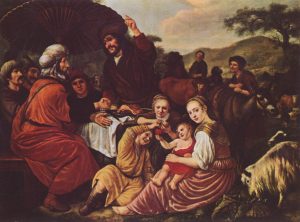Today’s “parasha”{פרשה} (weekly Torah portion) is “Yitro” {יתרו} – which is the Hebrew name of Jethro (Moses’ father-in-law). It is the fifth “parasha” in the Book of Exodus and is found in Exodus 18:1–20:23.
This “parasha” tells us about Jethro’s visit to Moses and his ‘golden’ advice on how to better organize the justice system of the newly formed nation of Israel by appointing ‘people as chiefs of thousands, of hundreds, of fifties, and of tens’ (Exodus 18:21)

It is fascinating to take a closer look at the “parasha” and to notice that there is a change of a ‘minor’ detail (allegedly) between what Jethro advised Moses and what actually happened. Here is Jethro’s advice:
“…And let them judge the people at all times. Every great matter they shall bring to you, but any small matter they shall decide themselves. So it will be easier for you, and they will bear the burden with you.” (Exodus 18: 22)
And this is what actually happened:
“And they judged the people at all times. Any hard case they brought to Moses, but any small matter they decided themselves.” (Exodus 18:26)
At first glance, one probably would not see the difference, but take another look and compare between:” Every GREAT matter they shall bring to you” (Jethro’s advice) to “any HARD case they brought to Moses”(what actually happened).
This is not a problem with the English translation because this ‘minor’ change of words exists in the original Hebrew as well. There, “great” is “Gadol” {גדול} (which could also be translated as big or large) and “hard” is “Kashe”{קשה} (which could also be translated as complicated or difficult).
And that is exactly the difference: Jethro advised Moses to divide the ‘legal cases’ into big (large) and small (little) which still exists today. We currently have a special court system whose jurisdiction is limited up to a certain amount of money and if it is higher amount the case goes to another court. But the difference in Jethro’s advice is that the judges of the people of Israel divided the ‘legal cases’ by their level of complexity – which means complicated cases went to higher rank judges regardless of the amount of money that was at stake.
Not such a minor difference after all…
